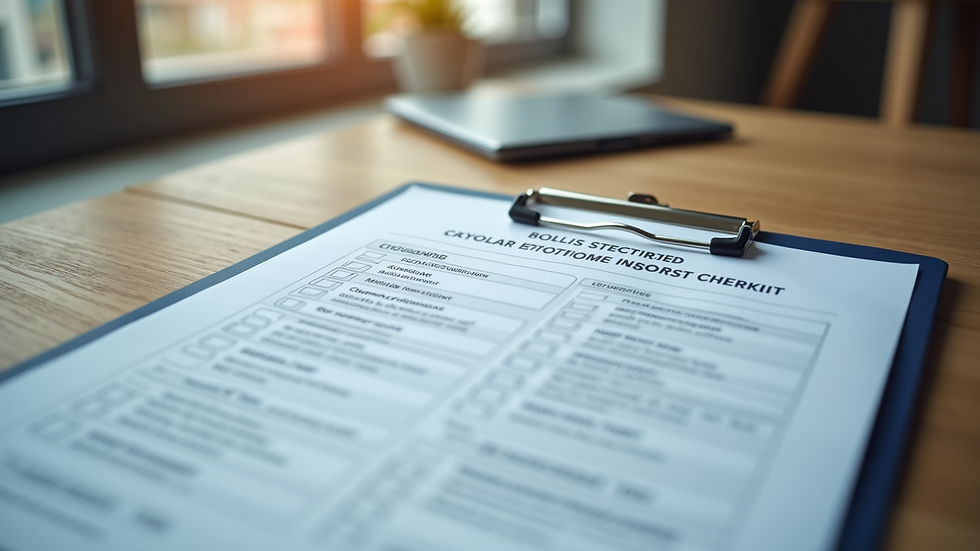Comprehensive Commercial Property Inspections
- john656592
- Sep 3, 2025
- 4 min read
When you’re involved in buying, selling, or managing commercial real estate, understanding the condition of the property is crucial. A thorough inspection can reveal hidden issues that might cost you thousands later. I want to guide you through the essentials of commercial inspections, so you feel confident and informed every step of the way.
What You Need to Know About Commercial Inspections Overview
Commercial inspections are different from residential ones. They cover a wider range of systems and components because commercial buildings are often larger and more complex. These inspections look at everything from the roof to the foundation, electrical systems, plumbing, HVAC, and even environmental concerns.
Why is this important? Because commercial properties are significant investments. A small problem overlooked today can turn into a major expense tomorrow. For example, a leaking roof might seem minor, but it can cause structural damage and mold growth if not addressed promptly.
When you schedule a commercial inspection, the inspector will provide a detailed report. This report helps you understand the current state of the property and what repairs or maintenance might be needed. It’s a valuable tool for negotiation and planning.

Key Components of a Commercial Property Inspection
A comprehensive inspection covers several critical areas:
Structural Integrity
Inspectors check the foundation, walls, floors, and roof for cracks, water damage, or signs of settling. These issues can affect the safety and longevity of the building.
Roof and Drainage Systems
The roof is a major expense to repair or replace. Inspectors look for damaged shingles, leaks, and proper drainage to prevent water damage.
Electrical Systems
Commercial buildings often have complex electrical setups. Inspectors verify wiring, panels, outlets, and safety devices to ensure everything meets code and functions safely.
Plumbing
Inspecting pipes, fixtures, water heaters, and drainage systems helps identify leaks, corrosion, or blockages that could disrupt business operations.
Heating, Ventilation, and Air Conditioning (HVAC)
Proper HVAC function is essential for comfort and energy efficiency. Inspectors assess the condition and performance of these systems.
Fire Safety and Compliance
Fire alarms, extinguishers, sprinkler systems, and emergency exits are checked to ensure compliance with safety regulations.
Environmental Concerns
Depending on the property’s history, inspectors may look for asbestos, mold, lead paint, or soil contamination.
Each of these components requires a trained eye and experience to evaluate properly. Skipping any part of the inspection can leave you vulnerable to unexpected problems.

How to Prepare for Your Commercial Inspection
Preparation can make the inspection process smoother and more effective. Here are some tips:
Gather Documentation
Collect any maintenance records, previous inspection reports, and building plans. These documents provide context and help the inspector focus on known issues.
Clear Access Areas
Ensure that all areas, including basements, attics, and mechanical rooms, are accessible. Remove obstacles that might block the inspector’s view.
Notify Tenants or Occupants
If the property is occupied, inform tenants about the inspection schedule. This helps avoid disruptions and ensures safety.
List Your Concerns
Write down any specific issues you’ve noticed or questions you want the inspector to address.
Be Present if Possible
Attending the inspection allows you to see problems firsthand and ask questions on the spot.
By preparing well, you help the inspector do a thorough job and get the most value from the inspection.

Why Choose Professional Commercial Property Inspections?
You might wonder why you can’t just do a quick walkthrough yourself or rely on a basic home inspection. Commercial properties are more complex, and professional inspectors have the training and tools to uncover hidden issues.
A professional inspection can:
Save You Money
Identifying problems early can prevent costly repairs later.
Provide Peace of Mind
Knowing the true condition of the property helps you make informed decisions.
Support Negotiations
Inspection reports can be used to negotiate repairs or price adjustments.
Ensure Compliance
Professionals understand local codes and regulations, helping you avoid legal troubles.
If you want a reliable, detailed inspection, consider scheduling with experts who specialize in commercial properties. For example, you can book your commercial property inspections with trusted professionals who know the Edmonton, St. Albert, and Sherwood Park areas well.
Taking the Next Step with Confidence
After the inspection, review the report carefully. Look for urgent repairs and plan for long-term maintenance. If you’re buying, use the findings to negotiate or decide if the property fits your needs. If you’re selling, addressing issues beforehand can increase your property’s value and attract buyers.
Remember, a commercial inspection is an investment in your property’s future. It helps you avoid surprises and protects your financial interests.
If you’re ready to take the next step, don’t hesitate to reach out to a trusted inspection service. They can guide you through the process and provide the detailed information you need to make smart decisions.
By understanding what a commercial inspection involves and why it matters, you’re better equipped to protect your investment. Whether you’re buying, selling, or managing a commercial property, a thorough inspection is your first line of defense against costly problems. Take action today and ensure your property stands strong for years to come.




Comments